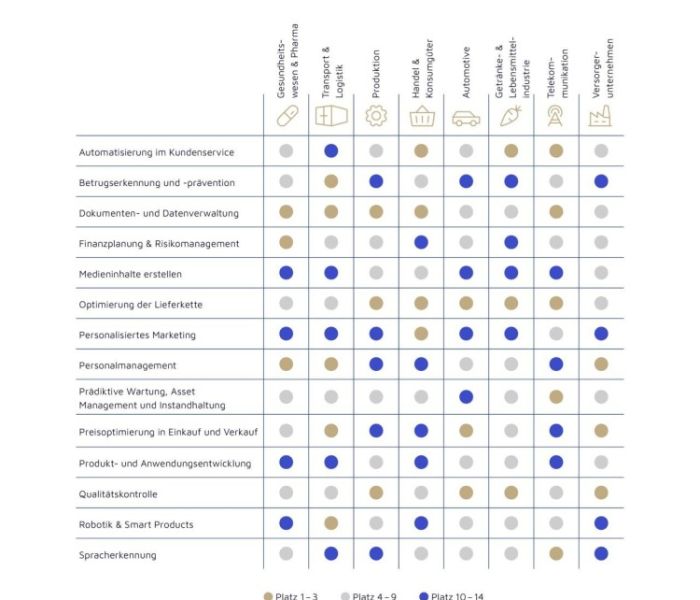Artificial Intelligence (AI) has become a crucial tool for companies in the DACH region. In a joint effort between valantic, a Digital Consulting, Solutions, and Software House, and the Handelsblatt Research Institute (HRI), the study examines the key application areas for businesses and the role of industry affiliation. The results reveal that AI applications in quality control, automated data and document management, and supply chain optimization are highly sought after.
Two-thirds of companies in DACH region benefit from AI applications
A recent study conducted by valantic in collaboration with the Handelsblatt Research Institute (HRI) surveyed approximately 700 C-level decision-makers from companies in Germany, Austria, and Switzerland. The findings revealed that two out of three companies are already experiencing measurable benefits from implementing AI applications. These benefits include increased efficiency, cost reduction, revenue and profitability growth, as well as savings in materials and expenses. Furthermore, the study examined the significance of various use cases for AI within these companies.
The respondents were asked to identify the most important application areas for their company. The top five areas were:
- Quality control involves the identification of defects and ensuring product quality through visual or sensory inspections
- Document and data management involves the automated extraction, processing, and organization of information from large volumes of documents and datasets with high accuracy
- The optimization of the supply chain involves accurately predicting demand, optimizing delivery routes, reducing inventory levels, and improving production and logistics planning
- The integration of sensor technology, control systems, and logic enables the autonomous optimization of hardware products through the automation of their functionalities
- Companies are using chatbots and virtual assistants to automate customer service tasks and provide support

valantic-Studie: Das sind die wichtigsten AI Use Cases in (Foto: valantic GmbH)
The study revealed that the creation of media content using AI applications has relatively low significance. Only just under one-fifth of the respondents considered generating creative content as one of the most important use cases for AI applications in their companies.
The study found that the relevance of different use cases for artificial intelligence (AI) applications depends on the industry affiliation of the companies. Industrial companies such as automotive manufacturers, beverage and food producers, as well as production companies place high importance on quality control through AI. This highlights the need for tailored AI solutions that address the specific challenges and requirements of each industry.
In the healthcare and pharmaceutical industry, the majority of C-level executives consider document and data management as a critical use case. On the other hand, in the retail and consumer goods sector, optimizing the supply chain takes precedence. For utility companies, the buying and selling of goods is of utmost importance, with many respondents citing price optimization as a significant use case. These findings highlight the industry-specific relevance of different AI applications and the need for tailored solutions to address specific challenges and opportunities.
Laurenz Kirchner, Managing Director and Data & AI Practice Lead at valantic, emphasizes the importance of clear goals, prioritization, and integration of AI into the company’s strategy. By doing so, companies can fully benefit from AI initiatives. It is crucial for companies to have a well-defined roadmap and align their AI efforts with their overall business objectives to achieve optimal results.

Anwendungsbereiche von KI: Relevanz unterscheidet sich nach (Foto: valantic GmbH)
The study conducted a comprehensive quantitative and qualitative survey among C-level executives from companies in the DACH region. It focused on various industries including automotive, healthcare and pharmaceutical, beverages and food production, retail and consumer goods, manufacturing, telecommunications, transportation and logistics, and utilities. This study aimed to provide valuable insights into the current state of artificial intelligence (AI) applications and their relevance in different sectors within the DACH region.
Overall, the study demonstrates that AI applications already offer diverse benefits to companies today. However, companies need to prioritize application cases that provide real added value and strategically integrate them into their corporate strategy in order to fully leverage the benefits of AI.
Artificial Intelligence (AI) has become an essential tool for companies in the DACH region. A study conducted by valantic in collaboration with the Handelsblatt Research Institute (HRI) examined the most important use cases for AI applications and how industry affiliation plays a role. The study found that AI applications in quality control, automated data and document management, and supply chain optimization are already highly valued.














